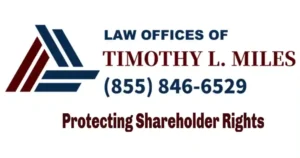Introduction to the Centene Class Action Lawsuit

The Centene class action lawsuit – captioned Lunstrum v. Centene Corporation, No. 25-cv-05659 (S.D.N.Y.) – seeks to represent purchasers or acquirers of Centene Corporation (NYSE: CNC) securities between May 24, 2016 and July 25, 2016, inclusive (the “Class Period”) and charges Centene and certain of Centene’s top executives with violations of the Securities Exchange Act of 1934.
If you suffered substantial losses and wish to serve as lead plaintiff of the Centene class action lawsuit, or just have general questions about you rights as a shareholder, please contact attorney Timothy L. Miles of the Law Offices of Timothy L. Miles, at no cost, by calling 855/846-6529 or via e-mail at [email protected].
Lead plaintiff motions for the Centene class action lawsuit must be filed with the court no later than September 8, 2025.
Please see the various investor resources below for an additional wealth of information.
Read on to learn the 5 most important things that all investors want:
The 5 Things All Investors Want and Are Entitled to Under the Law
- Access to financial statements: Investors want the right to receive timely and accurate financial reports (like audited or reviewed financial reports, including balance sheets, income statements, and cash flow statements), operational disclosures, and transparency regarding accounting policies.
- Access to corporate information: This includes the right to inspect company documents, such as bylaws, minutes of board meetings, annual reports, and other material developments impacting performance.
- Knowledge of risks and costs: Investors have the right to receive complete information about the risks, obligations, and costs associated with any investment, including commissions, sales charges, fees, and penalties.
- Understanding terms and conditions: Investors expect clear and understandable information regarding the terms and conditions of their transactions.

Information rights and transparency are fundamental principles ensuring that individuals and the public have access to information held by governments and organizations, promoting accountability and good corporate governance.
- Participation in corporate governance: Investors want to influence key corporate decisions, such as electing directors, approving mergers, and voicing opinions on executive pay, environmental commitments, and board composition.
- Voting on major issues: This includes the right to vote on resolutions, both ordinary and special, and propose their own resolutions.
- Nominating directors: Investors may have the right to nominate candidates for the board of directors, particularly in publicly traded companies.
- Attending meetings: The right to attend annual general meetings (AGMs) and other called meetings is also important.
Shareholder voting rights represent the ability of investors to participate in crucial decisions affecting a company’s direction and policies. This fundamental aspect of ownership allows investors to exert influence over corporate governance.
- Electing and removing the Board of Directors: Shareholders elect the board members, who are responsible for overseeing the company’s management and strategic direction.
- Approving significant corporate actions: This includes decisions like mergers and acquisitions, issuing new securities, and making substantial changes to the company’s operations or policies.
- Setting executive compensation: Shareholders can vote on executive compensation packages, influencing how the company incentivizes its leadership.
- Amending the company’s bylaws: This allows shareholders to shape the fundamental rules and governance structure of the company.
Impact on corporate governance
- Holding management accountable: Voting rights provide a mechanism for shareholders to hold the board and management accountable for their performance and decisions.
- Promoting transparency and efficiency: Institutional investors, who often hold significant voting power, can push for greater transparency and improved efficiency within the companies they invest in.
- Shaping strategic direction: Through their votes, investors can influence the long-term strategic direction and sustainability of the company.
- Influencing social and environmental policies: Shareholder activists can leverage voting rights to advocate for changes in areas like environmental and social responsibility.
Investor influence and activism
- Impact proportional to ownership: Generally, the number of votes an investor has is directly proportional to the number of common shares they own. This means larger investors have more influence.
- Shareholder proposals and campaigns: Investors can submit proposals for votes at shareholder meetings, initiate campaigns to sway other shareholders, and even engage in proxy fights to gain control of voting power.
- Engagement with management: Investors can also influence companies through direct dialogue with management, expressing concerns and advocating for specific changes.
- Institutional investor impact: Institutional investors, like mutual funds and pension funds, hold substantial power due to their significant ownership stakes and can significantly impact corporate governance through their voting decisions and engagement strategies.
- One share, one vote: This principle, widely considered a cornerstone of good corporate governance, suggests that voting power should be proportional to each shareholder’s economic interest.
- Dual-class share structures: Some companies utilize dual-class share structures, where certain shares carry greater voting rights than others, potentially limiting the influence of minority shareholders.
- Preferred vs. common stock: Common stockholders typically have voting rights, while preferred stockholders usually prioritize fixed dividend payments and often do not have voting rights.

The important of shareholder suffrage cannot be understated. Shareholder voting rights are a powerful tool that enables investors to actively participate in and influence the governance and direction of the companies in which they invest, which in turn, leads to better corporate governance, reforms and shareholder returns.
- Ownership interest: Investors want to understand the extent of their ownership in the company and how their shares may increase in value.
- Dividend rights: This includes the right to receive dividends when a company distributes profits.
- Claim to profits and assets: Investors want to know their claim to business profits and assets, especially in case of liquidation.
- Equity Ownership: This involves purchasing shares in a company with the aim of capital appreciation and potential dividends. Equity investors often have voting rights and the ability to influence company decisions. While generally riskier, equity investments offer a higher potential for returns than debt investments.
- Debt Ownership: This involves lending money to a business or government, typically through instruments like bonds, in exchange for interest payments and repayment of the principal. Debt investments are often considered fixed-income securities and usually have less risk and lower potential returns than equity investments.
- Convertible Instruments: These securities can be converted into another form of security, usually common stock, at a later time.
- Options and Other Non-Binding Privileges: These provide the holder with the right, but not the obligation, to buy or sell securities at predetermined prices within specific timeframes.
- Capital or Profit Interest: This grants the holder a claim on the entity’s assets upon liquidation or a share in its profits or losses.
- Fair and good faith treatment: Investors expect to be treated fairly, honestly, and in good faith by investment firms and advisors, including receiving advice that is suitable and in their best interest.
- Conflict of interest information: Investors have the right to be informed about any potential conflicts of interest that may arise between their advisor or firm and their investments.
- Privacy protection: Investors are entitled to a clear description of the firm’s privacy policies concerning personal and non-public information.
- Right to complain and seek resolution: Investors have the right to make a complaint and expect a fair process to resolve it.
- Right to sue for wrongful acts: Investors can take legal action against the company or individuals within it for wrongful acts, like breaches of fiduciary duty or fraud.
- Anti-dilution protection: This protects against the reduction of an investor’s ownership percentage if new shares are issued at a lower price than they initially paid.

Crucial aspects of protection and recourse for investors:
- Regulatory bodies like the Securities and Exchange Commission (SEC) and the Financial Industry Regulatory Authority (FINRA) establish and enforce rules to ensure fairness and transparency in financial markets.
- Key investor protection laws include the Securities Act of 1933, the Securities Exchange Act of 1934, and the Investment Advisers Act of 1940.
- The Dodd-Frank Act’s Investor Protection Act expands the SEC’s powers, enhances whistleblower protections, and emphasizes accountability for financial professionals.
- Investors have specific rights, including the right to fair and honest treatment, access to accurate and timely information, and the ability to voice opinions on corporate governance matters.
- The Investor Bill of Rights outlines key investor entitlements, such as receiving complete information about fees, accessing funds in a timely manner, and understanding transaction terms.
- These rights also encompass the expectation of advice tailored to the investor’s profile and the ability to file complaints with the firm’s management.
- Arbitration and Mediation: FINRA offers arbitration and mediation services to help resolve disputes between investors and brokerage firms or individual brokers. Arbitration is similar to a court process but generally faster and less complex, leading to a binding decision by independent arbitrators. Mediation is a voluntary process where a neutral mediator helps parties negotiate a mutually acceptable settlement.
- Legal Action: Investors can file lawsuits against companies or individuals who have violated securities laws or engaged in illegal activities.
- SIPC Protection: The Securities Investor Protection Corporation (SIPC) protects investors against losses when a brokerage firm fails, covering up to $500,000 for securities and cash (including a $250,000 limit for cash only). It’s crucial to note that SIPC protection is limited and doesn’t cover losses due to market fluctuations, bad investment advice, or unregistered investment contracts.
- Investor Complaints: Investors can file complaints with regulators like FINRA, which will investigate the matter and may take disciplinary action against the firm or individual involved. However, a complaint doesn’t necessarily guarantee financial compensation, which may require pursuing dispute resolution options like arbitration or mediation.
- Investor Education: Organizations like the North American Securities Administrators Association (NASAA) provide resources and programs to help investors of all ages understand the risks and rewards of investing, prevent fraud, and make informed decisions.
- Low Loan-to-Value (LTV) and Insurance: In certain investments, like private market debt, a low LTV ratio and insurance policies can offer additional protection for investors by reducing the risk associated with potential defaults or losses of underlying assets.
- Fiduciary Duty: The Investor Protection and Securities Reform Act of 2010 authorizes the SEC to impose regulations requiring a fiduciary duty from broker-dealers and investment advisors, meaning they must act in the best interests of their clients.
- Right to transfer ownership: Investors want to know they can freely transfer their ownership by selling their shares.
- Exit rights: This includes understanding various exit strategies and liquidity options, such as drag-along rights, tag-along rights, and redemption rights.
- Access to funds: Investors want to access their funds in a timely manner and understand any limitations or restrictions on that access.
- Initial Public Offering (IPO): A company lists its shares on a public stock exchange, allowing investors to sell their shares to the public.
- Mergers and Acquisitions (M&A): A company is bought by another company, or two companies combine, and investors receive cash or shares in the acquiring company.
- Secondary market transactions: Existing shareholders sell their shares to new investors in the private market, often used by employees or early investors looking for liquidity before an IPO or acquisition.
- Management Buy-Outs (MBOs): The existing management team acquires a majority stake from the current owners.
- Market conditions: The overall state of the economy and specific industries can greatly impact the feasibility and valuation of exits.
- Company valuation and financial performance: Strong financial performance and growth potential can make a company more attractive to buyers or potential public investors.
- Investor objectives and preferences: Different investors may have varying goals, such as maximizing returns, minimizing risks, or achieving a specific timeline.
- Regulatory landscape: Government regulations and antitrust concerns can affect the viability of mergers and acquisitions.
Liquidity risk
- Market downturns: During periods of economic uncertainty, even highly liquid assets may experience wider bid-ask spreads, making it more difficult to sell at a favorable price.
- Illiquid investments: Assets like real estate or private equity may take longer to sell and may require a price discount to attract buyers.
Contact Timothy L. Miles Today About an Centene Class Action Lawsuit
If you suffered substantial losses and wish to serve as lead plaintiff of the Centene class action lawsuit, or just have general questions about you rights as a shareholder, please contact attorney Timothy L. Miles of the Law Offices of Timothy L. Miles, at no cost, by calling 855/846-6529 or via e-mail at [email protected]. (24/7/365).
Timothy L. Miles, Esq.
Law Offices of Timothy L. Miles
Tapestry at Brentwood Town Center
300 Centerview Dr. #247
Mailbox #1091
Brentwood,TN 37027
Phone: (855) Tim-MLaw (855-846-6529)
Email: [email protected]
Website: www.classactionlawyertn.com
Facebook Linkedin Pinterest youtube



